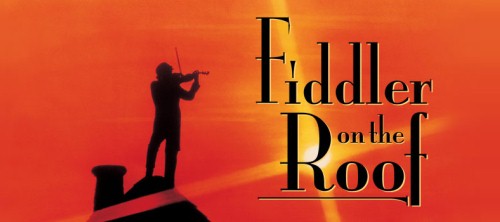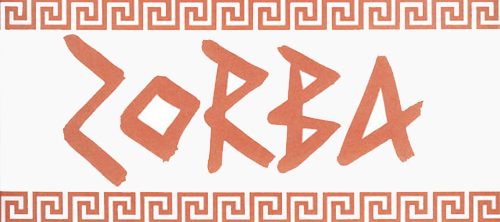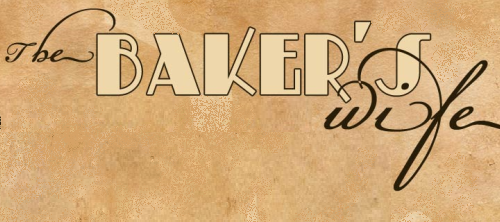Pas de biographie disponible.
Compositeur Musique additionelle Librettiste Parolier Metteur en scène Chorégraphe Producteur création Producteur version

Musical
Musique: Jerry Bock • Paroles: Sheldon Harnick • Livret: Joseph Stein • Production originale: 18 versions mentionnées
Dispo: Résumé Synopsis Commentaire Génèse Isnpiration Liste chansons
Genèse: Original productions The original Broadway production opened on September 22, 1964, at the Imperial Theatre, transferred in 1967 to the Majestic Theatre and in 1970 to The Broadway Theatre, and ran for a record-setting total of 3,242 performances. The production was directed and choreographed by Jerome Robbins – his last original Broadway staging. The set, designed in the style of Marc Chagall's paintings, was by Boris Aronson. A colorful logo for the production, also inspired by Chagall's work, was designed by Tom Morrow. The cast included Zero Mostel as Tevye the milkman, Maria Karnilova as his wife Golde (each of whom won a Tony for their performances), Beatrice Arthur and later Florence Stanley as Yente the matchmaker, Austin Pendleton as Motel, Bert Convy as Perchik the student revolutionary, Gino Conforti as the fiddler, and Julia Migenes as Hodel. Joanna Merlin originated the role of Tzeitel, which was later assumed by Bette Midler during the original run. Carol Sawyer was Fruma Sarah, Adrienne Barbeau took a turn as Hodel, and Pia Zadora played the youngest daughter, Bielke. Both Peg Murray and Dolores Wilson made extended appearances as Golde, while other stage actors who have played Tevye include Herschel Bernardi (in the original Broadway run), Theodore Bikel and Leonard Nimoy. Mostel's understudy in the original production, Paul Lipson, went on to appear as Tevye in more performances than any other actor, clocking over 2,000 performances in the role in the original run as well as several revivals. The production earned $1,574 for every dollar invested in it. The original West End production opened on February 16, 1967, at Her Majesty's Theatre and played for 2,030 performances. It starred Chaim Topol, who would also play Tevye in the 1971 film adaptation and the 1990 Broadway revival, and Miriam Karlin as Golde. Alfie Bass, Lex Goudsmit and Barry Martin eventually took over as Tevye. The show was revived in London in for short seasons in 1983 at The Apollo Victoria Theatre and in 1994 at The London Palladium. Broadway revivals The first Broadway revival opened on December 28, 1976, and ran for 176 performances at the Winter Garden Theatre. Zero Mostel starred as Tevye. Robbins directed and choreographed. A second Broadway revival opened on July 9, 1981, and played for a limited run (53 performances) at Lincoln Center's New York State Theater. It starred Herschel Bernardi as Tevye and Karnilova as Golde. Other cast members included Liz Larsen, Fyvush Finkel, Lawrence Leritz and Paul Lipson. Robbins directed and choreographed. The third Broadway revival opened on November 18, 1990, and ran for 241 performances at the George Gershwin Theatre. Topol starred as Tevye, and Marcia Lewis was Golde. Robbins' production was reproduced by Ruth Mitchell and choreographer Sammy Dallas Bayes. The production won the Tony Award for Best Revival. A fourth Broadway revival opened on February 26, 2004, and ran for 36 previews and 781 performances at the Minskoff Theatre. Alfred Molina, and later Harvey Fierstein, starred as Tevye, and Randy Graff, and later Andrea Martin and Rosie O'Donnell, was Golde. This production replaced Yente's song "The Rumor" with a song for Yente and two other women called "Topsy-Turvy". It was directed by David Leveaux. The production was nominated for six Tonys but did not win any. London revivals Fiddler was first revived in London in 1983 at the Apollo Victoria Theatre (a four-month season starring Topol) and again in 1994 at the London Palladium for two months and then on tour, again starring Topol, and directed and choreographed by Sammy Dallas Bayes, recreating the Robbins production. After a two-month tryout at the Crucible Theatre in Sheffield, England, a London revival opened on May 19, 2007, at the Savoy Theatre starring Henry Goodman as Tevye, Beverley Klein as Golde, Alexandra Silber as Hodel, Damian Humbley as Perchik and Victor McGuire as Lazar Wolf. The production was directed by Lindsay Posner. Robbins' choreography was recreated by Sammy Dallas Bayes (who did the same for the 1990 Broadway revival), with additional choreography by Kate Flatt.
Résumé: Un violoniste perché sur le toit, tentant de jouer un air de virtuose tout en maintenant constamment son équilibre (l'image n'est pas tirée des romans de Cholem Aleikhem mais des tableaux de Marc Chagall) : c'est à cela que ressemble le Juif moyen d'Europe de l'Est, vivant bon an mal an dans son petit village, parfois depuis des générations, en se raccrochant à ses traditions. Mais les temps changent…
Création: 22/9/1964 - Imperial Theatre (Broadway) - 3242 représ.

Musical
Musique: John Kander • Paroles: Fred Ebb • Livret: Joseph Stein • Production originale: 1 version mentionnée
Dispo: Résumé Génèse Liste chansons
Adapted from the 1952 novel Zorba the Greek by Nikos Kazantzakis and the subsequent 1964 film of the same name, it focuses on the friendship that evolves between Zorba and Nikos, a young American who has inherited an abandoned mine on Crete, and their romantic relationships with a local widow and a French woman, respectively.
Genèse: Original Broadway Production The musical opened on Broadway on November 16, 1968 at the Imperial Theatre, where it ran for 305 performances and twelve previews. Directed by Harold Prince and choreographed by Ron Field, the cast included Herschel Bernardi, Maria Karnilova, Carmen Alvarez, John Cunningham, and Lorraine Serabian. Scenic design was by Boris Aronson, costume design was by Patricia Zipprodt, and lighting design was by Richard Pilbrow. The production received several Tony Award nominations, winning the Tony Award for Best Scenic Design. 1970 US tour The musical was revised to be less "austere" and toured with John Raitt, and included a new song for him ("Bouboulina"). Chita Rivera played the role of "The Leader". Because reviews were not favorable, the show did not return to Broadway at that time. The bus and truck tour featured Vivian Blaine ("Guys and Dolls") as Madam Hortense and Michael Kermoyan ("Camelot" & "Anya") in the title role, with Prince directing and choreography by Patricia Birch. 1983 Broadway Revival The 1983 revival directed by Michael Cacoyannis and choreographed by Graciela Daniele opened on October 16, 1983 at the Broadway Theatre, where it ran for 362 performances and 14 previews. The cast included Anthony Quinn and Lila Kedrova (who had both starred in the film version, the latter winning an Oscar for her performance), in addition to Robert Westenberg, Debbie Shapiro, and Rob Marshall. Other productions Zorba has been produced professionally in Argentina (2003). Cast: Raúl Lavié, María Rosa Fugazot, Miguel Habud, Julia Zenko, Marcelo Trepat, Alejandro Viola (replaced by Gustavo Monje), Roberto Fiore and Andrea Mango. Broadway Revival Zorba was expected to be revived on Broadway in 2011, with David Leveaux set to direct. Antonio Banderas had been chosen as Zorba.[4] In an interview with producer Fran Weissler, the revival of Zorba is set for 2011-2012. As of May 2015 this revival has not been produced. Cara Joy David, writing in the Huffington Post in January 2015, wrote: "Zorba...The production was expected to be mounted during the 2011-2012 theatrical season. Alas it never came to be.... or at least not yet." Concert production Zorba was presented in the New York City Center Encores! staged concert series on May 6-10, 2015. The cast featured John Turturro, Zoe Wanamaker, and Marin Mazzie in the lead roles and direction by Walter Bobbie.[7]
Résumé: The setting is Crete in 1924. Nikos, a young student, has inherited a mine which he plans to resurrect to its working state. With his new friend, Zorba, he travels from Piraeus and lodges with a French woman, Hortense. It soon becomes apparent that Zorba and Hortense are attracted to each other and there soon becomes a romantic involvement. Zorba tries to get Nikos interested in a young Widow who brings them lunch but Nikos treads wearily. Zorba is very much his own man and a law unto himself. Nikos has given him money with which to buy supplies to enable them to reopen the mine but Zorba goes off and spends it all on a belly dancer. Hortense, meanwhile is romantically dreaming of marriage with Zorba - and a wedding ring! Despite his misgivings Nikos plucks up his courage and goes to visit the Widow. Their meeting is witnessed by a young man, Pavli, who is somewhat mentally unbalanced. resulting from witnessing the assignation of the Widow and Nikos, Pavli throws himself into the sea. Next morning, village celebrations are stilled when Pavli's body is washed up onto the shore. Zorba returns to the village with no supplies for the mine, no money and no wedding ring for Hortense. Nikos tells the Widow how much she means to him - and the feelings are reciprocated. But their love comes too late. A member of Pavli's family stabs her to death, blaming her for Pavli's suicide. The bad news does not stop here. A survey of the mine shows that it has been closed too long and that it will be impossible to reopen it. Zorba is a philosophical man, but Nikos cannot understand Zorba's attitude to those who killed the Widow. Zorba explains that one must accept death as one accepts life, all there is left to do is dance. Hortense has become very ill and in her delirium, she imagines she is a young girl again. Zorba rushes to her side but to no avail. Nikos and Zorba, in their mutual grief, begin to dance. Nikos decides to return to Athens - and Zorba to wherever life leads him.
Création: 16/11/1968 - Imperial Theatre (Broadway) - représ.

Musical
Musique: Stephen Schwartz • Paroles: Stephen Schwartz • Livret: Joseph Stein • Production originale: 4 versions mentionnées
Dispo: Résumé Synopsis Génèse Isnpiration Liste chansons
In 1976, 28-year-old Stephen Schwartz seemed to be the most successful Broadway songwriter of his generation, with three musicals playing in New York simultaneously: Godspell (which transferred to Broadway following a lengthy off-Broadway run during the year), Pippin, and The Magic Show. Schwartz's next musical was thus highly anticipated. It was The Baker's Wife, based on the French novel La Femme du Boulanger by Marcel Pagnol and Jean Giono, and the classic 1938 film directed by Pagnol, about a romantic triangle involving a baker, his wife, and a shepherd. Originally, the production starred Topol (known for the London and film versions of Fiddler on the Roof), but he was eventually replaced, surprisingly, by the character actor Paul Sorvino, a newcomer to musical theater. Opposite him was up-and-coming Juilliard-trained actress/singer Patti LuPone, while Kurt Peterson ably played the shepherd. The show opened its pre-Broadway tour in Los Angeles on May 11, 1976, but something went wrong on the way to New York, and The Baker's Wife never got there, closing in Washington, D.C.
Genèse: The musical theater rights of the Marcel Pagnol's 1938 film were originally optioned in 1952 by producers Cy Feuer and Ernest Martin. Composer Frank Loesser and librettist Abe Burrows, who had worked with Feuer and Martin on Guys and Dolls and How to Succeed in Business Without Really Trying were attached as authors. The production to star Bert Lahr, however, never materialized. Nearly a decade later Zero Mostel was named to take the lead. By 1976 the rights had devolved to producer David Merrick. The production by Stephen Schwartz and Joseph Stein toured the United States for six months in 1976, undergoing major retoolings along the way. It played the Dorothy Chandler Pavilion in Los Angeles in May 1976 and also the Kennedy Center, Washington, DC. (in November 1976). Topol as the baker Amiable, was replaced by Paul Sorvino during the last 2 weeks of the Kennedy Center run, and his wife Geneviève was played by Carole Demas who was eventually replaced by Patti LuPone. The production never reached Broadway, the authors having pulled out of the production in the try-out process. After hearing the song "Meadowlark" countless times in auditions, director Trevor Nunn persuaded the authors to mount a London production. The Baker's Wife, starring Alun Armstrong and Sharon Lee-Hill, opened in the West End at the Phoenix Theatre on November 27, 1989 and closed on January 6, 1990, after 56 performances. This production, too, was ill-fated: though reviews were strong and audience reaction positive, the production was steadily losing money. According to Carol De Giere, "While reviewers offered praise, audiences were small and the show closed after only 56 performances. Schwartz explains,'The major thing that was wrong was that it was just too long'...Nunn comments 'Every performance there had a standing ovation, which is not at all normal in the English provinces." Bowing to financial reality, the show closed prematurely, but received the Laurence Olivier Award nomination for Musical of the Year. The creative team reunited for the 1997 production at The Round Barn Theatre at Amish Acres in Nappanee, Indiana, that was directed by Scott Schwartz, and the production at the Goodspeed Opera House, Norma Terris Theatre, Chester, Connecticut in November 2002. The Papermill Playhouse, Milburn, New Jersey, produced the show from April 13 - May 15, 2005. The director was Gordon Greenberg, with choreography by Christopher Gattelli and the cast that starred Alice Ripley as Genevieve, Max von Essen as Dominique, Lenny Wolpe as Amiable, Gay Marshall (Denise) and Richard Pruitt (Claude). The Papermill included the reworking of the relationship between the characters of Geneviève and Dominique as well as new lyrics for "Proud Lady". An Australian premiere of the show, directed by Prof. Peter Fitzpatrick, had a Melbourne production in late 2007. The York Theatre, New York, presented a staged concert October 26–28, 2007. The award winning Union Theatre produced The Baker's Wife in Sept/Oct 2011 starring Lisa Stokke and Michael Matus. It was staged and directed by Michael Strassen and received rave reviews prompting reviewer Mark Shenton to write 'Michael Strassen reclaims The Baker's Wife forever as the affecting miniature masterpiece that has always been lurking inside it' (see website reviews/Union Award)
Résumé: Set in 1935 in a small French village, 'The Baker's Wife' explores the nature of marriage and the unpredictable excitement of the knight in shining armour. If bread represents life then the baker's new young wife represents danger to the people of this community. We discover stories told when you were a child can often backfire horribly in adult life.
Création: 11/5/1976 - Dorothy Chandler Pavilion (Los Angeles) - représ.

Musical
Musique: Charles Strouse • Paroles: Stephen Schwartz • Livret: Joseph Stein • Production originale: 5 versions mentionnées
Dispo: Résumé Synopsis Génèse Liste chansons
Genèse: The Broadway production opened on August 21, 1986 at the Mark Hellinger Theatre with little advance sale and to mostly indifferent reviews, and it closed after only four performances (and 18 previews). Directed by Gene Saks and choreographed by Ron Field, the cast included Teresa Stratas as Rebecca Hershkowitz, Larry Kert as Nathan Hershkowitz, Lonny Price as Ben, Judy Kuhn as Bella Cohen, Dick Latessa as Avram Cohen, Marcia Lewis as Rachel Halpern, and Terrence Mann as Saul, a union organizer. Despite its failure, it garnered a good deal of attention during the awards season. In 1991, Sony released a studio recording of the score. It featured most of the original cast joined by Julia Migenes replacing Stratas. Revised versions In 1991 the creators reunited to present a dramatically rewritten and severely streamlined production at The American Jewish Theatre, New York City, directed by Richard Sabellico. The version had 9 actors playing all of the roles, and a reduced set, with two pushcarts on stage and imaginary windows, with the actors describing the exterior activity. The young immigrant mother has a best friend of almost equal importance, and the story is now told by David, the heroine's young son. The Colony Theatre Company, Los Angeles, California presented Rags in 1993. They reworked the show again, staging it first at Florida's Coconut Grove Playhouse (February 1999) and then the Paper Mill Playhouse in New Jersey in November 1999. The revised version cut the cast to 15, from the original Broadway cast of 30. According to Strouse, "We tried to do too much.And now it's tightened, more focused. People got lost in it...The diffuse, scattered story now centers on Rebecca Hershkowitz, a young immigrant mother who escapes to the Lower East Side after a pogrom, and her love affair with Saul, an American labor organizer trying to unionize the sweatshop where she works...The [original] score was influenced by Middle Eastern, Irish, Scottish, English folk, American honky-tonk, obviously jazz and ragtime and klezmer -- even Greek music of that day, and Broadway, too...It is now 'more impressionistic'." In 2006, Schwartz, Stein and Strouse collaborated on the World AIDS Day Concert version of the musical, celebrating the 20th Anniversary of the show's Broadway opening. The concert was at Times Square's Nokia Theatre and featured Carolee Carmello, Gregg Edelman, Eden Espinosa, Lainie Kazan and Michael Rupert.
Résumé: With great passion and humor, the story is told of Rebecca, a naive Russian immigrant arriving at Ellis Island with her young son, and their struggle to make a life for themselves in the New World. She goes to work in a sweatshop while searching for her husband who has preceded them to America. When they are finally reunited she discovers that his assimilation is not entirely for the best. His desire to change their name and strip away their ethnic culture so as to fit in with his cronies distresses Rebecca, whose gradual enlightenment leads her into union activities against the very men her husband so hopes to impress. Subplots concern an elderly immigrant, his daughter, and their respective romances, one of which ends tragically. This sweeping saga of awakenings and disappointments, of greed and power, of strength and love is as deeply moving and inspirational a musical as you could hope to present.
Création: 21/8/1986 - Mark Hellinger Theatre (Broadway) - représ.